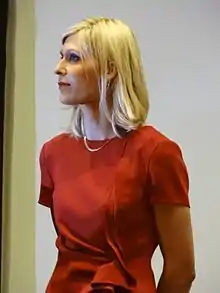Virginie Duby-Muller
Virginie Duby-Muller (born 16 August 1979) is a French politician of The Republicans (LR) who has been a member of the National Assembly since the 2012 elections, representing Haute-Savoie's 4th constituency.[1] Within her party, she has been serving as deputy chairwoman since 2019, under the leadership of chairman Christian Jacob.[2]
Virginie Duby-Muller | |
|---|---|
 Virginie Duby-Muller in 2013 | |
| Member of the National Assembly for Haute-Savoie's 4th constituency | |
| Assumed office 20 June 2012 | |
| Preceded by | Claude Birraux |
| Personal details | |
| Born | 16 August 1979 Bonneville, Haute-Savoie, France |
| Political party | The Republicans |
| Alma mater | Grenoble Institute of Political Studies |
Political career
In 1997, at the age of 18, Duby-Muller joined the Rassemblement pour la République (RPR), which would later become the UMP.[3]
Since joining the National Assembly in the 2012 elections, Duby-Muller has been serving on the Committee on Cultural Affairs and Education. In addition to her committee assignments, she is a member of the French-Ethiopian Parliamentary Friendship Group. From 2013 until 2017, she was also part of the French delegation to the Inter-Parliamentary Union (IPU).[4]
In the Republicans’ 2016 presidential primaries, Duby-Muller endorsed Nicolas Sarkozy as the party's candidate for the office of President of France. When the primaries' winner François Fillon became embroiled in a political affair during his campaign, she was one of the LR members who publicly called on him to step down.[5]
Since the 2017 elections, Duby-Muller has been serving as one of the eleven deputy chairpersons of the Republicans' parliamentary group, under the leadership of chairman Christian Jacob.
In the Republicans’ 2017 leadership election, Duby-Muller endorsed Laurent Wauquiez as chairman[6] and later became his campaign's spokesperson.[7] She later endorsed Christian Jacob to succeed Wauquiez as the party’s chairman in the run-up to the Republicans’ 2019 convention.[8]
Political positions
In July 2019, Duby-Muller voted against the French ratification of the European Union’s Comprehensive Economic and Trade Agreement (CETA) with Canada.[9]
References
- "Annemasse (Haute-Savoie). Virginie Duby-Muller nommée à la vice-présidence des Républicains". www.ledauphine.com (in French). Retrieved 2020-02-24.
- "Annemasse (Haute-Savoie). Virginie Duby-Muller nommée à la vice-présidence des Républicains". www.ledauphine.com (in French). Retrieved 2020-02-24.
- Charlotte Rotman (December 18, 2012), Virginie Duby-Muller, valeurs montantes Libération.
- Virginie Duby-Muller French National Assembly.
- «Nous, élus de droite et du centre, demandons solennellement à François Fillon de se retirer» L'Opinion.
- Ludovic Vigogne (October 11, 2017), La liste des 136 parrains de Laurent Wauquiez L'Opinion.
- Virginie Le Guay (November 16, 2017), La jeune garde de Laurent Wauquiez Paris Match.
- La jeune garde des députés LR soutient Christian Jacob Le Journal du Dimanche, 7 July 2019.
- Maxime Vaudano (24 July 2019), CETA : qui a voté quoi parmi les députés Le Monde.